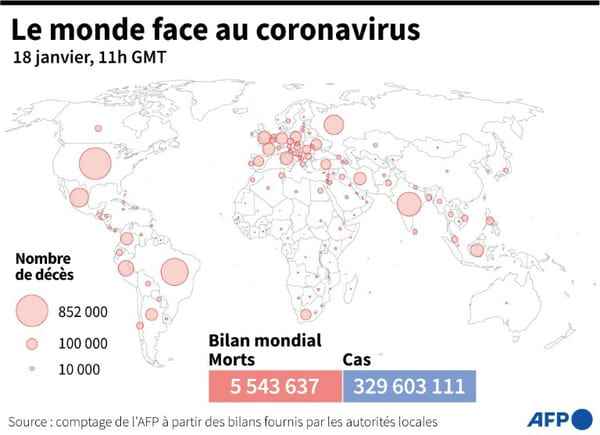The Covid-19 pandemic “is far from over”, the director general of the World Health Organization (WHO) warned on Tuesday, warning against the idea that the Omicron variant is benign.
“Omicron continues to sweep the planet. (…) Make no mistake, Omicron causes hospitalizations and deaths, and even the least serious cases overwhelm healthcare institutions,” Tedros Adhanom Ghebreyesus said at a press conference. in Geneva (Switzerland).
“This pandemic is far from over and given the incredible growth of Omicron around the world, it is likely that new variants will emerge,” he added.
On January 11, the European Medicines Agency (EMA) estimated that although the disease is still in the pandemic phase, the spread of the Omicron variant will transform Covid-19 into an endemic disease with which humanity can learn to cope. to live.
“As immunity increases in the population – and with Omicron there will be a lot of natural immunity in addition to vaccination – we will move quickly towards a scenario that will be closer to endemicity,” said Marco Cavaleri, head of vaccine strategy at the Amsterdam-based EMA.
Others have also spoken of “the beginning of the end” of the pandemic with Omicron.
But the head of the WHO is much more cautious: “In some countries, Covid cases seem to have peaked, which gives hope that the worst of this last wave has passed, but no country has yet emerged. of business”.
He expressed particular concern that many countries have low Covid vaccination rates.
“Omicron may be less severe on average, but the narrative that it is a mild illness is misleading (and) harms the overall response and costs more lives,” Dr Tedros said.
– Not to give up” –
He felt that “now is not the time to give up and wave the white flag” because it is still “possible to significantly reduce the impact of the current wave” thanks to public health measures and vaccines.
Because, he said, “Vaccines may be less effective at preventing Omicron infection, and its transmission, than they were against previous variants, but they are still exceptionally effective at preventing serious forms of the disease and deaths”.
Last week, the WHO Technical Advisory Group on the composition of Covid vaccines considered that “it would be good” to develop vaccines which, in addition to preventing severe forms of the disease and deaths , have a marked impact on infection prevention and transmission.
Until these vaccines become available, these experts call for an update of the composition of current vaccines “to ensure that they continue to offer the levels of protection recommended by the WHO”, including against Omicron and future variants.
On Tuesday, Soumya Swaminathan, chief scientist at the WHO, stressed that one should not wait for the marketing of vaccines specific to Omicron to be vaccinated, because the current vaccines are “effective”.
“Certainly having variant-specific vaccines is one approach, but a better approach might be to have polyvalent vaccines,” she said.
At his side, Michael Ryan, in charge of health emergencies at the WHO, for his part stressed that it was difficult to compare national strategies.
But, he said, “I would much rather be in a situation where the vast majority of the population has never been infected with Covid and is now achieving high levels of vaccine protection.”
All rights of reproduction and representation reserved. © (2022) Agence France-Presse

